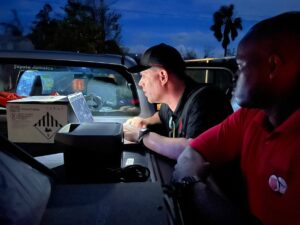Domestic violence survivors in Seattle find financial assistance and housing support through the Community Advocacy Program.
The American Psychiatric Association reports approximately one in three women and one in four men have experienced physical abuse by an intimate partner, along with emotional and psychological trauma that can persist long after physical injuries heal.
Among the many traumas of domestic violence (DV), financial strain is a significant barrier that forces many survivors to remain in unsafe situations.
“Control is a part of domestic violence, and within that, there’s control over finances that can keep someone trapped in an abusive relationship,” said Ciara Murphy, Director of Domestic Violence Programs with The Salvation Army Seattle Social Services.
According to Murphy, removing financial barriers gives survivors a better foundation to break away from DV situations and build a safe and stable future.
For DV survivors in Seattle and King County, Washington, The Salvation Army Community Advocacy Program (CAP) offers critical support, including financial assistance, housing resources, case management and counseling to help individuals leave unsafe situations and rebuild their lives.
The CAP has operated in Seattle for over 20 years, providing free services and support to anyone over 18. Each year, the program assists around 260 households, the majority of which are women with children, according to Murphy.
“We advocate for survivors and support them as they move from homelessness or unsafe living environments,” she said. “Oftentimes, what people need most is financial assistance.”
Clients can access the CAP through referrals from hospitals, Salvation Army programs or by visiting The Salvation Army Seattle Social Services office. Staff also meet clients in public spaces to ensure accessibility and safety on an as-needed basis.
“The Community Advocacy Program plays a major role in helping survivors escape abuse. By connecting them to safe housing and financial assistance, we can help them look forward to a safer future.”
Jacinta Lowe, Community Advocacy Program Housing Advocate
Case managers and a legal advocate are then available to help plan next steps.
“Our legal advocate will help clients explore divorce and parenting plans for long-term custody situations,” said Murphy. “Other times, someone needs to break their lease because of domestic violence, and there’s a legal procedure for that.”
The cost of intimate partner violence exceeds $8.3 billion annually in the U.S., according to the Center for Domestic Peace. This includes direct and indirect costs, such as medical and emergency care, lost productivity due to workplace absenteeism and expenses related to fleeing an unsafe home.
In 2024, the Seattle Municipal Court recorded 1,476 domestic violence cases, with 632 of those involving assault.
Among the survivors is Suzanne Foster*, a mother of two, who was referred to the CAP by hospital staff after being admitted with facial injuries sustained in an attack by her children’s father.
Through working with case managers, she was placed in a women’s shelter while her children stayed with a relative.
“She had been married for 17 years and was fearful of starting over on her own,” said Murphy. “Over the years, verbal put-downs led to isolation, financial control and violence.”
With assistance from the CAP, Foster received help applying for apartments and was eventually approved. With the support of donated funds, CAP covered her move-in costs and provided additional security measures, including new locks and a doorbell camera.
For Foster, a new reality focused on safety for herself and her children had begun.
“This is the first time in our lives that we are going to bed unafraid,” Foster told CAP staff.
She now receives therapy for PTSD and has started a full-time job. The CAP also connected her to a local legal aid organization for assistance with divorce and childcare services.
According to Murphy, many clients have grown up witnessing domestic violence, leading them to view it as a normal part of life.
“Trauma can be extremely damaging to a person’s functionality,” she said. “We consider this when conducting case management and adjust to meet each individual’s needs and experiences.”
According to Jacinta Lowe, Community Advocacy Program Housing Advocate, lack of financial assistance and social support forces individuals to remain in unsafe homes, allowing abusive cycles to persist or escalate.
With Lowe’s help, clients can secure immediate shelter through Salvation Army housing programs or other shelters while they work toward permanent housing. On average, she assists between eight and eleven individuals at a time.
“They just tell us how happy they are that we can come alongside them,” Lowe said, noting she often sees a sense of relief in them. “For many, it’s the first time they’ve felt supported and understood.”
To help lessen the obstacles of escaping DV, Lowe hopes to see more housing options for female survivors in Seattle, noting there are a limited number of shelters dedicated exclusively to this population.
“The Community Advocacy Program plays a major role in helping survivors escape abuse,” Lowe said. “By connecting them to safe housing and financial assistance, we can help them look forward to a safer future.”
*Name changed for privacy
Do Good:
- Imagine we had a good-living modern village with real talk, real stories and real support for being human and hopeful. Join the Hopefuls Collective and find a place of low-pressure, high-encouragement love anytime you need it, whether you know it or not. Get in the group today.












